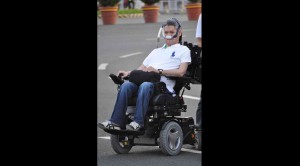Support group meeting challenges for rare diseases

JUN Magdaraog is proof that with prompt management and family support, patients with rare diseases can live longer and higher quality of life. Photo by Charles E. Buban
(First of two parts)
Pompe disease is so rare that few doctors in the world knew about it. What is even fewer are the treatment options available considering this genetic disorder is not at the top of the agenda of many drug research companies.
This was the situation that Juan Magdaraog had to deal when he was about 10 years old and started showing signs of muscle weakness that eventually prevented him from walking or sitting up.
It took his family five years to know his sickness. After seeing a muscular dystrophy specialist in San Francisco, United States, that Juan’s condition was accurately identified.
Cynthia Magdaraog, Juan’s mother, said “We can’t blame the doctors. The many signs and symptoms are not unique to Pompe disease. These are weakness of hip muscles that leads to difficulty of moving the legs; weakness of spinal muscles that leads to excessive curving of the back; impairment of respiratory muscles that leads to respiratory insufficiency; sleep-disordered breathing; and eventual need for mechanical ventilation (to move air in and out of the lungs).”
Pompe disease could only be identified after taking a blood test of the creatine kinase (a protein found mainly in the heart, brain and skeletal muscle) and a muscle biopsy (in which muscle tissue is examined for excessive glycogen storage and degeneration).
Another huge hurdle
Despite knowing what ails Juan, the Magdaraog family had to face another huge hurdle. “Pompe disease generally progresses very rapidly among babies and is almost always fatal by the age of one, usually from heart and/or breathing failure whereas a Pompe disease that developed later in life, like what Juan had, is not as fatal as symptoms could be managed if addressed promptly,” said Cynthia, who is happy to report that Juan is doing well at 36.
Indeed, one would consider Juan fortunate as he has the full support of his family. In fact, he was able to keep his condition at bay, enabling him to finish college—he is an Industrial Design graduate from the De La Salle-College of Saint Benilde—and work.
Juan has been confined in a purposely-built wheelchair and has been breathing through a Bilevel Positive Airway Pressure machine (that helps him breathe more easily). He has always been a patient-advocate of the Philippine Society for Orphan Disorders (www.psod.org.ph), a nonprofit organization that aims to help individuals in the Philippines who suffer from rare disorders.
Expensive
Cynthia, who is also PSOD’s president, said: “Like most rare diseases, Pompe disease is expensive to manage, considering one needs a team of specialists such as cardiologist, neurologist and respiratory therapist. In addition to enzyme replacement therapy, supportive care is critical if patients with Pompe’s disease are to maximize their abilities and quality of life. Juan has proven this.”
This is also why, through PSOD, Cynthia and a number of dedicated doctors and experts have been relentlessly sourcing the much-needed funds from foreign and local donors, as well as arrange with drug companies to make available under compassionate use the special food formulas, medications and enzyme replacement therapies crucial to sustaining and improving the health condition of patients.
“My son is not the only one afflicted with rare diseases. The Institute of Human Genetics of the National Institutes of Health of the University of the Philippines Manila has identified over 300 Filipinos, mostly children, afflicted with over 40 types of rare disorders. Aside from Pompe disease, other conditions identified include Apert Syndrome, Galactosemia, Homocystinuria, Lowe Syndrome, and Muscular Dystrophy.”
Message to Filipinos
Recently, Cynthia’s group joined the world in celebrating the 7th Rare Disease Day at the SM Mall of Asia (MOA) globe area in a simple candle-lighting ceremony. According to the PSOD, the event sent a message to the Filipinos, especially children afflicted with rare disorders and their families that they are not alone in the struggle for a better quality of life.
“This was the day (Feb. 28 was International Rare Disease Day) where countries all over the world conduct a high visibility campaign for rare disease. Here in the Philippines, we emphasized how important it is for Filipino parents to identify if their child is inflicted with a rare disease so that their children can live productive and normal lives,” Cynthia said.
But more than support from organizations and pharmaceutical companies, PSOD is hoping a law would soon be passed here in the country to help patients with rare diseases. “What we need is perhaps some sort of access to medical treatment and drugs. I know that our children’s cases are rare but we believe we still deserve some form of assistance from the government,” Cynthia said. (Next: Bill hopes to assist Filipinos with rare diseases)